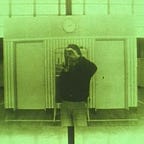Tokyo Sonata: Echoes of the Self
As haunting as it is beautiful, Kiyoshi Kurosawa is indeed the modern master of horror, and in this film he proves it, but not in the way you’d expect from watching his previous films.
Although in many ways this is similar to his other films, it takes that ocean of existential dread and drops it on the characters’ heads, leaving everyone lost and helpless.
The camera makes no judgments. A lot of medium-long shots give the film a sense of realism lacking any sort of emotional manipulation. This is also reflected in the very “restrained” color palette used. And so, just like the maestro of an orchestra, it guides this symphony (or sonata), shifting our attention from one character to the next, seamlessly weaving and driving the story forward.
The music is used sparingly but effectively, especially in that last bone-chilling last scene that ties it all together.
For the most part, we follow Ryûhei Sasaki (Teruyuki Kagawa), the patriarch of the family that we’re observing. He is a victim of this modern society. In the opening minutes, we watch him as he loses his job and falls into the mire of unemployment. Trying to make sense of it all and unable to absorb the shock, he keeps it a secret from his family. This secret starts a domino effect that will affect all of the family.
Ryuhei starts neglecting his youngest son, Kenji, and treats him as a nuance to be dealt with rather than a child to raise and nurture. His father is even against the idea of learning the piano, and this results in many conflicts with unfortunate results, but luckily Kenji finds a way to take piano lessons and escape his loneliness and existentialism through music.
Which brings us to the mother, Megumi. She tries hard to be the balancing force in the household, but in turn, she too faces reality and tries to find her place in the world. Then there is the eldest son, Takashi. His role is the smallest compared to the rest, but it is still significant to the story. His role and character provide us with the point of view of the youth of Japan.
The entire cast gives a great performance and brings life to these individual storylines, and the highlights are definitely the mother and the father, which overshadowed the others a bit. This work needs multiple viewings to appreciate it because each character has a subplot of their own that deserves our full attention.
And so the film deals with the personal problems of each member of this family, but it also gives us a lens to look at the society this family lives in, and even though the actual experiences of these characters might be foreign to us, there’s a universality to the struggle depicted here.
This is where director Kiyoshi Kurosawa is most successful; it is in looking deep within the human condition and reflecting upon it, and that is where the true horror is.
There are too many themes shown here, but the film never feels spread out too thin as it focuses on one central idea, our place in the world. The other themes are deliberately left unexplored but give us just enough to make us question them.
The film doesn’t provide us with a straightforward conclusion, because there is no end. It’s just another beginning for not just the characters but our own lives outside the film.
